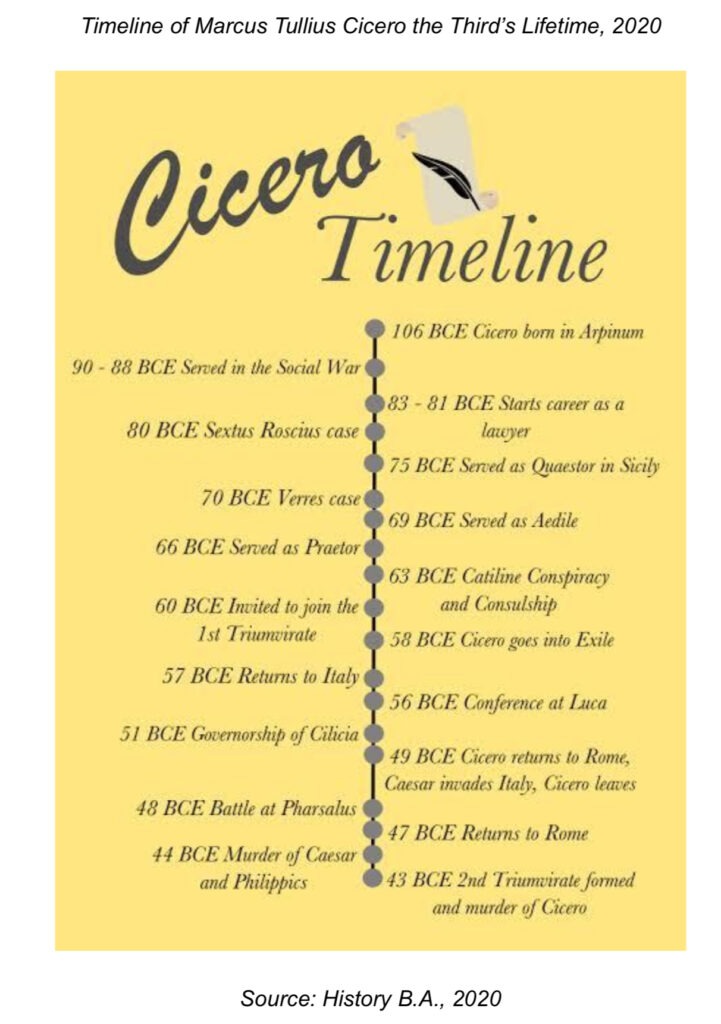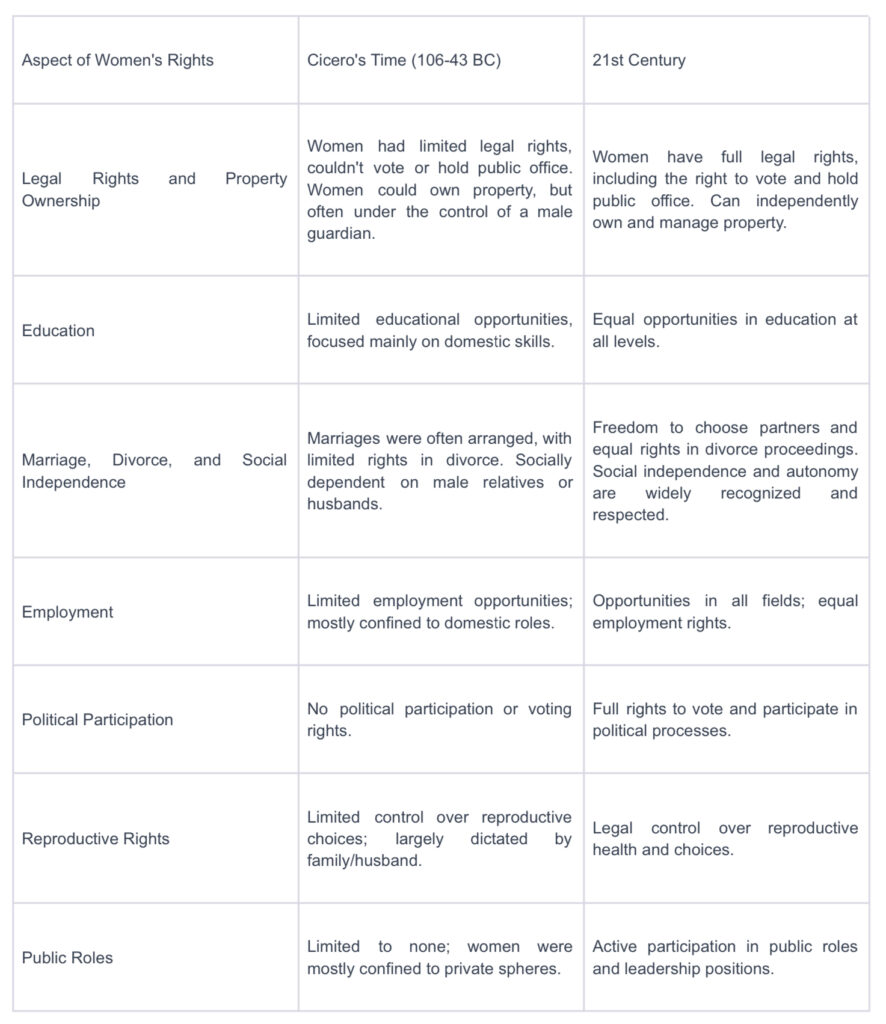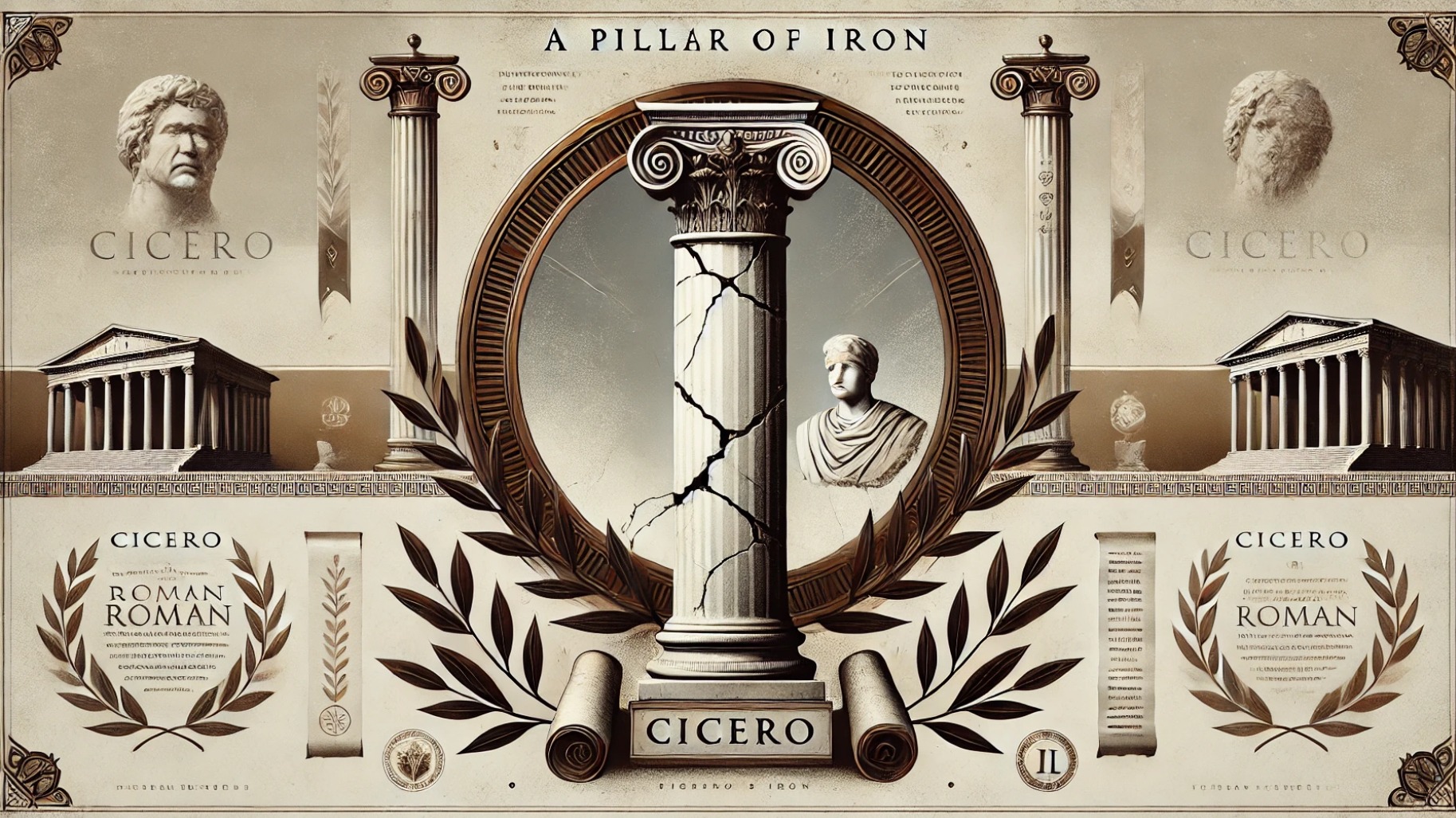Cicero’s full name: Marcus Tullius Cicero the Third
Summary
Taylor Caldwell spent years of intense research to give birth to this masterpiece of a book, “A Pillar of Iron” in 1965. She tells the full life story of Marcus Tullius Cicero the third, citing his orations and personal letters to compose a complete history as accurately as possible. While being densely packed with history, politics, and philosophy, Caldwell manages to make this novel a delightful read, using flowery language to enchant the readers into falling in love with the ancient Roman countryside. A vast multitude of ideas and topics are considered in the book, and in this essay I will be focusing on human nature, and women’s role in society from a Feminist perspective, tending towards Constructivist ideas.
Keywords: Human Nature, Feminism, Cicero, Roman Society, Philosophy, Politics
Timeline of Marcus Tullius Cicero the Third’s Lifetime, 2020

Source: History B.A., 2020
On Human Nature
“I will speak of men,” said Helvia, “and in this I include women for we are all a part of mankind, and perhaps the most important part.” (Caldwell, 1965, page 83)
The portrayal of human nature is deeply embedded in the context of Roman society’s values, religion, and philosophy. As noted early on page 30, “The people of Arpinum remembered the old days when a Roman was a truly fearless and free and revered her god and practiced the virtues of piety, charity, courage, patriotism, and honor.” This quote sets the tone for the rest of the book and details the majority of the topics covered. The Ciceroni men were in a moral dilemma, yearning for a return to a more virtuous past while knowing that the Rome they knew was already long gone.
The theme of law and its divine nature is a recurrent theme. According to the Romans, law comes from the divine and is necessary to prevent men’s power struggle from causing chaos. These perspectives are seen in Cicero’s struggles in maintaining justice in a corrupt society. It’s said, “There is no good in mankind, save that which is vouchsafed it from god, by virtue of god and by his loving kindness. For man was born to evil, and he cannot free himself from the web of iniquity without god, no matter his striving or his good will,” (Caldwell, 1965, p.213) reflects on the inherent moral struggles of humanity. Because of these ideas, the book is deeply steeped in Realist tones, frequently stating and showing man’s aggressive, egotistic nature.
The quote, “A Traitor,” said Curius… “A man,” he said (Ibid., p. 361), encapsulates the multifaceted nature of human character in Roman politics. Each label they use – traitor, fool, base-born fool, man of emotion, hasty judgments – reflects different perceptions of a single individual. Sulla’s concluding remark, “A man,” implies that all these attributes are inherent in human nature. This reflects the theme that intrinsic flaws exist within every individual. The statement, “The Jews are quite correct when they declare that man is desperately wicked from his birth and evil from his youth.” … “It is my duty to aspire above my human nature” (p. 64), is a depressing image of human nature, continuing the sense of inherent evil. This perspective is particularly significant in the context of the Roman Republic, “where virtues and vices coexist” (ChatGPT, 2024), often leading to internal and external conflicts. The last part of the quote reflects Cicero’s personal conclusion to transcend these natural flaws. It encapsulates the key theme of the constant struggle for moral betterment and the aspiration to rise above human instincts.
In Cicero’s concluding speech at the trial of Sextus Roscius (Caldwell, 1965, p. 389), he sadly speaks of the moral decay of Roman society, emphasizing his concern for the loss of humanity and compassion in a city of rampant crime and cruelty. This quote underlines the consequences of societal moral decline, where politics and entertainment overshadow fundamental values like self-control and justice. Caldwell uses this speech to critique the Roman society’s preference for charismatic politicians over virtuous leaders, warning of the inevitable downfall of a society that forsakes its moral compass.
Later in the book the reflection, “Did not God create him (man) so meager and so without knowledge?” (Ibidem, p. 438), puts us in a more existential contemplation of man’s inherent limitations and the divine role in human life. This idea follows Caldwell’s exploration of the philosophical and theological implications of human nature.
Finally, Marcus’s statement to Terentia, “If one can do no good in politics, one should at least be harmless” (Ibid., p. 491), alongside his realization about the complexities of political life compared to philosophical ideals, reveals a practical approach to governance. This contrasts with the more idealistic view of philosophers, highlighting the practical challenges and moral compromises inherent in political life.
The Role of Women in Ancient Rome
From a Constructive Feminist point of view, Caldwell’s narrative suggests that women, while often kept hidden in the background of the male-dominated Roman society, hold a substantial influence. They are the foundation of the city. This is evident in the quote, “Now you must have a woman’s wisdom and rationality. Men have dreams; women have reality. Both are necessary” (p. 82). Here, Caldwell highlights the difference of gender roles, emphasizing the grounding role women play against the aspirations of men.
Table Comparing Women’s Rights in Ancient Times versus the 21st Century

Source: ChatGPT, 2024
The story also critiques the societal limitations placed on women’s roles but still manages to justify them. As mentioned, “If women ever become philosophers or scientists or artists and neglect the loom and the frying pans, who will raise the loudest plaint, in spite of their previous admiration of female prodigies? Men.” This shows how patriarchal societies simultaneouslyadmire and constrain women, acknowledging their potential but limiting their roles to domestic spheres. It’s said that women are the balance of life, and without them men would revert to beasthood.
Marcus’ mother Helvia is the main source of womanly insight in the book. She reflected that “men were of a fragile nature, easily hurt, easily wounded, for all their swagger and their deep voices and their mastery of affairs. Women were made of iron in comparison” (p. 459). This speaks to the silent strength and resilience of women, overshadowed by the more visible power of men.
In an interesting evolution of word-usage, Caldwell describes many things as ‘iron’. It’s used to describe someone’s smell, a stern face, a dictatorship, and more. Through all these variations, women are the only ones to be “made” of iron. When Noë calls Marcus a “pillar of iron”, he evokes all the emotions around the word in the text.
It’s explained to us that traitors undermine the pillars of a nation. By calling Cicero a pillar of iron, it indicates that his honor, sense of justice, and dedication to the law will never be broken (even long after the marble city falls).
Since women are made of iron, and we see Helvia’s heavy involvement in Ciceros’ upbringing, the logical conclusion is that women (Helvia specifically in this case) are the real pillars of iron that protect society.
Terentia
So then we credit all success of men to women, but are their doings as honorable if they crave recognition in an arrogant, ego-centric way?
Terentia states that “Marcus owes everything to her for his success” (p. 570) reinforces the theme of women as the architects behind the scenes, shaping the paths of great men; Terentia has her network of wives that listen to their ‘powerful husbands’ and spread gossip through the town at lightning fast speeds. But it’s questionable whether or not Cicero owes her. As a married couple they were a strategic team from the very start, living in the same house and sharing resources. When we first met Terentia, she’s described as very unwomanly in character and body. She denies luxuries and prefers everything serious… but when she saw Marcus’ success from her own advice, she suddenly decided she did want more. When they first moved in together, she was displeased at the too-much grandeur of their house, yet when he comes back from exile she’s unhappy that the new house it too small and not luxurious enough.
Striving for equality and recognition is a just cause, but her instability of opinion and failure to truly work together with Cicero ruin the strong and beautiful portrait of women previously painted in the book of Helvia, Livia, and even the slave girls all as strong pillars of influence.
Conclusions
“Some hidden divinity impels me to protest, to struggle, to exhort, though I know it is all in vain.” Cicero (p. 702) … Marcus writing to Atticus “I prefer peace at any price,” he said, and wondered if that, too, was not a betrayal. He was torn by a thousand winds.”
In the end I didn’t like Terentia, she definitely had more potential. Buying into the Feminist idea that she helped formed Cicero’s success— my conclusion is that she ultimately failed in maintaining control over her husband over time. Managing the books and finances is essential, she definitely helped maintain and further him, but her social advice could have potentially changed Marcus’ course for the better had he heeded her advice more consistently or had she imposed it more effectively. Although a failure, Terentia still contributed to the idea that women are the essential iron pillars that support men through their political endeavors.
They all speak so poorly of the nature of man, but Cicero is a man, and his nature is empathetic and just. Therefore man’s nature can’t be all bad.
Antonius was the most honest character in the whole story. I highly identify with his poor idealist mind coming to learn the horrors of the world.
The book that has it all: politics, philosophy, geography, love, loss, war, peace, existential crises and more! New favorite, I can’t wait to read more about Cicero and ancient times.
On a random Marxist note, the social classes were very important and divided in Ancient Rome and Greece; the book gives us an inside look into the interdependent dynamics between the working class, the equestrians, and the patricians.
For the first time in my life I am doubting how effective democracy is. Are the people responsible and educated enough to have a political voice? “In democracies, they are not free and they are not slaves; therefore they live in danger.” (Julius quoting Scaevola,
page 275).
I’m not sure this book helped with my personal eternal existential crisis, but I feel less
alone knowing that even since ancient times there have been people who believed in humanity as stubbornly as I do, and were able to affect great positive change. Plus there are infinite fantastic quotes from Caldwell, Cicero, and his companions alike (p. 723).
References
- History, B. A. (2020, 31 agosto). The successes and failures of Cicero. Bitesized Ancient
History.
https://bitesizedancienthistory1.wordpress.com/2020/09/01/the-successes-and-failures-of- cicero/
2. Caldwell, T. (1965). A pillar of iron. Fawcett.
3. Class and social order in the Roman Republic. (2019, 26 abril). Brewminate: A Bold
Blend of News and Ideas.
https://brewminate.com/class-and-social-order-in-the-roman-republic/
4. ChatGPT. (n.d.). OpenAI. https://chat.openai.com/#









No responses yet